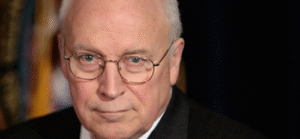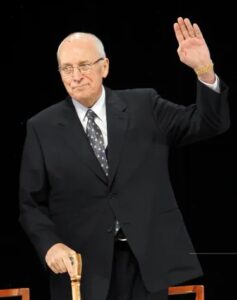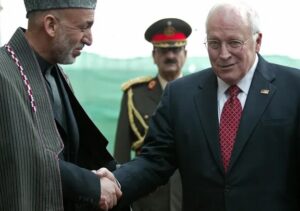American Politicians Respond to the Death of Former Vice President Dick Cheney

Richard B. “Dick” Cheney — the 46th vice president of the United States, one of the most powerful figures to ever hold that office, and for many years the intellectual and strategic engine behind Republican national security policy — died on November 3, 2025. He was 84. According to the statement released by his family, Cheney passed away at home, surrounded by his wife of 61 years, Lynne, and their daughters, Liz and Mary, after complications from pneumonia and longstanding cardiac and vascular disease. People.com+2People.com+2
His family’s tribute was personal and tender, far from the hard-edged reputation he carried in Washington:
“Dick Cheney was a great and good man who taught his children and grandchildren to love our country, and to live lives of courage, honor, love, kindness, and fly fishing.”
That sentence summed up the two sides of Cheney — the one the public saw, and the one known only to those around his kitchen table.
A Vice President Who Rewrote the Job
Cheney served as vice president under President George W. Bush from 2001 to 2009 and, in the view of historians, transformed what had traditionally been a secondary role into one of the strongest policy platforms in the modern presidency. After the September 11, 2001 terrorist attacks, Cheney became the most forceful internal advocate for a muscular, pre-emptive national security posture — backing the invasions of Afghanistan and Iraq, the expansion of the surveillance state, and a far more assertive understanding of executive power. Many analysts still call him “the most influential vice president in American history.” AP News+1
But the reaction to his death was not only about power. It was about longevity. Cheney had held almost every major national post a Republican could dream of: White House chief of staff to President Gerald Ford, member of Congress from Wyoming, Secretary of Defense for President George H. W. Bush during Operation Desert Storm, and finally vice president — all milestones that together made him a through-line in GOP foreign policy from the 1970s through the 2000s. People.com

Immediate Tributes From Former Presidents
The news of Cheney’s death prompted fast, respectful responses from officials who had worked alongside him — even from those who had often found themselves on the opposite side of policy debates.
-
President Joe Biden issued condolences noting that although he and Cheney “disagreed vigorously,” Cheney’s “commitment to service and to his family was never in doubt.” Biden, who served in the Senate and later as vice president during the Obama years when the legacy of the Iraq War was still unfolding, framed Cheney’s life as one of “serious public service over decades.”
-
Vice President Kamala Harris likewise called Cheney “a dedicated public servant who answered the call under multiple administrations,” stressing that his loss “marks the passing of someone who cared deeply about this nation.” Washington Blade
-
Former President Bill Clinton highlighted Cheney’s willingness to serve even in periods of sharp partisanship, noting that leaders can disagree fiercely on policy and still recognize devotion to country.
The most detailed and personal remembrance came from the George W. Bush Presidential Center. Bush, who had first asked Cheney in 2000 to lead his vice-presidential search but then decided Cheney himself was “the one I needed,” praised him as “a decent, honorable man” and “among the finest public servants of his generation,” a counselor who was steady in crisis and blunt in private. George W. Bush Presidential Center+2Facebook+2
Bush’s statement underlined what many in the administration have said for years: in the days after 9/11, when the country was disoriented and frightened, Cheney was the one insisting on process, intelligence, and action — sometimes to a degree that later drew controversy, but always, Bush said, “with seriousness of purpose.” The Texas Tribune

Noticeable Silences
Even as tributes rolled in from Bush, Clinton, Biden, Harris, former cabinet officials, and members of Congress, a few high-profile Republicans stayed quiet.
As of November 4, 2025, former President Donald Trump had not released a public statement, though his press secretary confirmed that he had been notified and that flags at federal buildings had been lowered to half-staff “in accordance with statutory law.” Reporters pressed the White House on whether Cheney might lie in honor at the Capitol, but Press Secretary Karoline Leavitt said that process was not being handled by the administration at that time. palmbeachpost.com+1
Vice President J.D. Vance was also notably silent online, continuing to post about travel and campaign appearances rather than the death of the former vice president. That absence was especially visible because Cheney, in his later years, had broken with Trump-era populism and even endorsed the Biden-Harris ticket in 2024 — a decision that underscored how far Cheney had moved from parts of his own party. Hindustan Times+1
A Life Lived in Defiance of Illness
Cheney’s public toughness was mirrored in his private medical history. He suffered at least five heart attacks, beginning when he was just 37 years old, and spent decades living with serious coronary disease. He had a pacemaker installed in 2001, later required a left ventricular assist device (LVAD) in 2010 to keep his heart pumping, and in 2012, at age 71, he received a heart transplant after waiting on the list for nearly two years. The 2012 transplant was widely covered because it allowed Cheney to continue a political and public speaking career many had assumed was over. People.com
Even in their statement on his death, his family mentioned how grateful he was to the anonymous donor who extended his life — a rare moment of vulnerability from a man better known for secrecy and hard lines.
Brushes With Danger — and With Public Scrutiny
Cheney’s life was not only threatened by disease. In February 2007, while visiting Bagram Air Base in Afghanistan, a Taliban suicide bomber detonated explosives at the gate. The Taliban later said Cheney was the target. Several people were killed, though Cheney himself was unharmed and continued his trip, meeting with Afghan President Hamid Karzai before returning to the U.S. The episode reinforced the perception of Cheney as a figure who lived close to the center of America’s post-9/11 wars — and who was willing to go to the frontlines of that policy. AP News
A year earlier, in 2006, he was at the center of a very different kind of national story: the quail-hunting accident in Texas, when he accidentally shot fellow hunter Harry Whittington in the face. Whittington survived, though he carried birdshot in his body for years and suffered a damaged larynx. Cheney waited several days before speaking publicly about it, accepted responsibility but did not apologize, and the incident became late-night fodder for weeks — an unusual moment when the famously controlled vice president became a punchline. AP News

Long Public Career, Lasting Controversy
What makes Cheney’s death important to so many political figures is not just that he was vice president — it’s that he was there for almost every major Republican pivot in the last half-century.
-
Nixon/Ford era: he joined the executive branch in 1969 and became White House chief of staff under President Gerald Ford;
-
Congress: he represented Wyoming in the House, eventually serving as House Republican Whip;
-
Defense Secretary: under George H. W. Bush, he oversaw the Gulf War and emerged with high approval ratings;
-
Vice President: under George W. Bush, he became the internal muscle behind the Iraq War, enhanced interrogation, and the expansion of surveillance — policies that defined U.S. power in the early 2000s and also generated lasting criticism. AP News+1
Because of that record, reactions to his death have been respectful but not uncritical. Even in news obituaries, analysts pointed out that Cheney will always be linked to the 2003 invasion of Iraq, to legal justifications for waterboarding and warrantless surveillance, and to a vision of the presidency that gave the White House extraordinary latitude in wartime. AP News+1
Yet for those who worked with him — especially Bush — the public memory they chose to emphasize was loyalty, steadiness, and seriousness. “He held to his convictions and prioritized the freedom and security of the American people,” Bush said. The Texas Tribune
The Man His Family Knew
For all the policy and controversy, the Cheney family asked Americans to remember someone humbler: a man who loved his wife, doted on his daughters, proudly watched Liz Cheney become a member of Congress, and liked nothing better than a quiet day of fly fishing. That image was echoed by Bush-era staffers who said that behind closed doors Cheney was funny, dry, and deeply attached to his family — a side the public rarely saw. People.com+1

Legacy
Dick Cheney’s death closes the book on a generation of Republican national security leaders who shaped the post-9/11 world. He will be remembered simultaneously as:
-
one of the most capable and prepared public servants of his era (as Bush put it),
-
one of the most polarizing vice presidents in modern history, and
-
a man who outlived severe illness again and again to keep doing the work he thought the country needed. George W. Bush Presidential Center+1
Tributes will continue, and quieter statements will likely arrive from figures who waited — partly out of political distance, partly because Cheney himself had broken with parts of the GOP late in life. But the broad outline is already clear: to Washington, he was power and certainty; to his family, he was love and loyalty. To American politics, he was an indelible presence — one whose decisions will be studied, praised, and debated for decades.